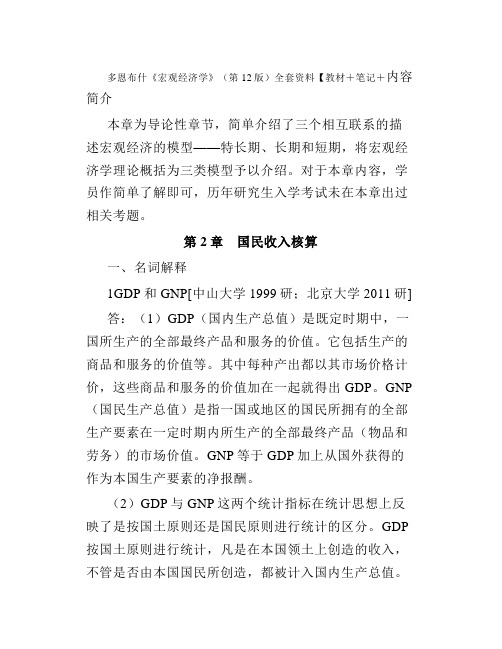宏观经济学教辅资料 (4)
《宏观经济学》全套课件-2024鲜版

再贴现政策
公开市场操作
中央银行通过在公开市场上买卖有价 证券来调节货币供应量,实施效果表 现在调节市场流动性、影响市场利率 等方面。
通过调整再贴现率来影响商业银行的 贷款规模和利率,实施效果表现在调 节市场利率、引导资金流向等方面。
2024/3/27
17
财政政策与货币政策协调配合
1
松紧搭配的财政政策与货币政策:在经 济过热时,采取紧缩的财政政策和宽松 的货币政策;在经济衰退时,采取宽松 的财政政策和紧缩的货币政策。这种搭 配方式可以相互补充,发挥各自优势, 实现经济的稳定增长。
发展不平衡问题
全球经济一体化可能加剧各国之间的发 展不平衡,使得贫富差距进一步扩大。
VS
主权让渡问题
在全球经济一体化过程中,国家需要让渡 部分经济主权,参与国际经济合作和竞争 ,这可能对国家经济安全带来挑战。
2024/3/27
32
感谢您的观看
THANKS
2024/3/27
33
货币市场与资本市场之间 的联系
货币市场主要满足短期资金需求,而资本市 场则满足长期资金需求。两者之间的联系在 于短期资金需求和长期资金需求的相互转化 。
2024/3/27
相互作用机制
当货币市场利率上升时,短期融资成本增加 ,企业可能转向资本市场寻求长期融资。反 之,当资本市场利率下降时,长期融资成本 降低,企业可能减少短期融资需求。此外, 中央银行可以通过调节货币政策工具来影响 货币市场利率和资本市场利率的变动趋势,
2024/3/27
25
经济增长源泉和影响因素分析
政策因素
政府政策对经济增长具有重要影响,如财政政策、货 币政策、产业政策等。
制度因素
经济制度、产权制度、市场制度等对经济增长具有重 要影响。
黄亚钧《宏观经济学》(第4版)笔记和课后习题(含考研真题)详解

(2024年)高鸿业《宏观经济学》全套课件(完整版)

2024/3/26
相互补充
微观经济学为宏观经济学提供基础,宏观经济学为微观经济学提 供背景。
5
宏观经济学研究方法
总量分析
研究整个经济的总需求与总供给,以 决定国民收入与就业水平。
均衡分析
探讨各种市场和经济总体的均衡状态 及其实现条件。
2024/3/26
动态分析
引入时间因素,分析经济变量随时间 变化的过程及规律。
物价
探讨物价水平、通货膨胀及紧缩的机理与调 控。
2024/3/26
就业
分析就业水平、失业原因及政策对就业的影 响。
国际收支
研究国际收支平衡、汇率变动及国际经济关 系。
4
宏观经济学与微观经济学关系
研究对象不同
微观经济学研究个体经济单位,宏观经济学研究整体经济。
研究方法相似
都使用数量分析、均衡分析等方法。
03
可持续发展战略实施途径
包括促进绿色经济发展、推动清洁能源革命、加强全球环境治理等。
2024/3/26
26
07 总结与展望
2024/3/26
27
本书内容回顾与总结
宏观经济学基本概念
包括国内生产总值、失业率、 通货膨胀率等关键指标的详细
解释。
2024/3/26
宏观经济政策
深入探讨了财政政策、货币政 策以及供给管理政策在宏观经 济调控中的应用。
经济增长源泉
包括资本积累、技术进步、劳动力投入等。
经济增长模型
如哈罗德-多马模型、索洛模型等,用于解释经济增长的动 因和机制。
24
发展中国家经济增长实践
2024/3/26
发展中国家经济增长特点
与发达国家相比,发展中国家经济增长往往呈现出更高的波动性 和不稳定性。
《宏观经济学》全套课件(2024)

经济增长因素及政策
3
经济增长受资本积累、技术进步、劳动力素质提 高等因素影响,政策方面可包括促进投资、鼓励 创新、提高教育水平等。
2024/1/30
11
03
货币市场与资本市场均衡
2024/1/30
12
货币市场均衡原理及影响因素
2024/1/30
货币市场均衡原理
货币市场的均衡是由货币供给和货币需 求之间的平衡关系决定的。当货币供给 等于货币需求时,货币市场达到均衡状 态。
利率水平
利率是货币市场上资金供求的价格,其 变动会直接影响货币市场的均衡状态。
收入水平
收入水平决定了人们的交易需求和预防 需求,从而影响货币市场的均衡。
通货膨胀率
通货膨胀率的高低会影响人们对货币的 实际需求,进而影响货币市场的均衡。
13
资本市场均衡原理及影响因素
资本市场均衡原理
资本市场的均衡是由资本供给和资 本需求之间的平衡关系决定的。当 资本供给等于资本需求时,资本市
《宏观经济学》全套课件
2024/1/30
1
目录
• 宏观经济学概述 • 国民收入核算与决定 • 货币市场与资本市场均衡 • 财政政策与货币政策效果分析
2024/1/30
2
目录
• 开放经济条件下宏观经济政策选择 • 当前热点经济问题探讨
2024/1/30
3
01
宏观经济学概述
2024/1/30
4
宏观经济学定义与研究对象
绿色低碳发展理念在宏观经济政策中的实践
分析绿色低碳发展理念在宏观经济政策中的实践,如环保政策、能源政策等。
2024/1/30
绿色低碳发展理念对经济发展的影响
探讨绿色低碳发展理念对经济发展的影响,如促进经济转型升级、提高经济增长质量等 。
多恩布什《宏观经济学》(第12版)全套资料【教材+笔记+题库+】

多恩布什《宏观经济学》(第12版)全套资料【教材+笔记+内容简介本章为导论性章节,简单介绍了三个相互联系的描述宏观经济的模型——特长期、长期和短期,将宏观经济学理论概括为三类模型予以介绍。
对于本章内容,学员作简单了解即可,历年研究生入学考试未在本章出过相关考题。
第2章国民收入核算一、名词解释1GDP和GNP[中山大学1999研;北京大学2011研]答:(1)GDP(国内生产总值)是既定时期中,一国所生产的全部最终产品和服务的价值。
它包括生产的商品和服务的价值等。
其中每种产出都以其市场价格计价,这些商品和服务的价值加在一起就得出GDP。
GNP (国民生产总值)是指一国或地区的国民所拥有的全部生产要素在一定时期内所生产的全部最终产品(物品和劳务)的市场价值。
GNP等于GDP加上从国外获得的作为本国生产要素的净报酬。
(2)GDP与GNP这两个统计指标在统计思想上反映了是按国土原则还是国民原则进行统计的区分。
GDP 按国土原则进行统计,凡是在本国领土上创造的收入,不管是否由本国国民所创造,都被计入国内生产总值。
GNP按国民原则进行统计,凡是本国国民收入,不管生产要素是否在国内,都被计入国民生产总值。
(3)国外要素支付净额(NFP)是指本国生产要素在世界其他国家获得的收入减去本国付给外国生产要素在本国获得的收入。
因此,国内生产总值就可以通过国民生产总值减去国外要素支付净额获得:GDP=GNP-NFP。
2名义GDP[中山大学2002研]答:名义GDP指在既定时期中,以该时期的价格计价的,或者有时表示为以现值美元计价的最终产品的价值,即用生产物品和劳务的当年价格计算的全部最终产品的市场价值,它没有考虑通货膨胀因素。
由于通货膨胀等原因,价格可能会发生强烈变化,故为方便比较而引入实际GDP的概念。
实际GDP是指用从前某一年的价格作为基期价格计算出来的当年全部最终产品的市场价值。
二者之间的关系式为:实际GDP=名义GDP÷GDP平减指数。
宏观经济学(高鸿业第五版)PPT课件-2024鲜版

2024/3/28
25
货币政策与财政政策协调配合
逆周期调节
在经济下行时,采取扩张性货币政策 和财政政策以刺激总需求;在经济过 热时,采取紧缩性政策以抑制通货膨 胀。
政策互补性
货币政策和财政政策应相互配合,形成 政策合力,以实现宏观经济调控目标。
34
实现包容性增长和可持续发展
促进就业和减贫
01
通过经济增长和结构调整,创造更多就业机会,减少贫
困和不平等现象。
加强社会保障体系建设
02
完善养老、医疗等社会保障制度,保障人民基本生活需
求。
推动可持续发展
03
坚持经济发展与环境保护相协调的原则,推动绿色低碳
循环发展,实现经济、社会和环境的可持续发展。
相互联系
微观经济学和宏观经济学是相互联系的,微观经济 学的理论可以为宏观经济学提供基础和分析工具, 而宏观经济学的理论也可以为微观经济学提供背景 和指导。
6
02
国民收入核算与决定
2024/3/28
7
国内生产总值核算方法
生产法
通过核算一定时期内各生产单位创造的增加值 总和来计算GDP。
2024/3/28
支出法
通过核算一定时期内整个社会购买最终产品的总支出 计算GDP。
收入法
通过核算整个社会在一定时期内获得的收入来 计算GDP。
8
国民收入决定理论
01
简单国民收入决定 理论
仅考虑产品市场均衡,忽略货币 市场、劳动市场和国际市场等因 素。
IS-LM模型
02
03
总供给-总需求模型
同时考虑产品市场和货币市场均 衡,分析利率和国民收入的决定。
2024版曼昆《宏观经济学》课件讲义

总需求曲线表示不同价格水平下,经济社会中商品和劳 务的需求量。它通常向右下方倾斜,表明价格水平与总 需求量之间存在负相关关系。总需求曲线的推导基于货 币数量论、利率效应、财富效应等因素。
影响因素分析
影响总需求曲线的因素包括物价水平、收入水平、利率 水平、消费者信心等。物价水平上升会导致实际货币供 应量减少,进而降低总需求;收入水平提高会增加消费 和投资支出,从而增加总需求;利率水平下降会降低储 蓄倾向,增加消费和投资支出,提高总需求;消费者信 心增强会促进消费和投资支出增加,推动总需求上升。
经济秩序紊乱
通货膨胀会破坏正常的经 济秩序,使价格信号失真, 导致资源配置不合理。
经济增长因素、模型及政策含义
劳动力投入
劳动力数量和质量的提高对经济增长有重要推动作用。
资本积累
物质资本和人力资本的积累是经济增长的重要基础。
经济增长因素、模型及政策含义
• 技术进步:科技创新和技术进步是提 高生产效率、促进经济增长的关键因 素。
同时,汇率变动还会影响国际资本流动和国内物价水平。
国际收支平衡表编制及分析方法
国际收支平衡表的基本构成
包括经常账户、资本与金融账户、错误与遗 漏账户等。
经常账户分析
主要分析货物贸易、服务贸易、收益和经常 转移等项目的变动情况。
宏 观 经 济 学PPT资料62页

中国宏观经济 ----对外经济
单位:亿美元 Year Import Export 1980 200.17 181.9 2019 2436.1 2661.5 2019 9558 12180 2019 11331 14285 2009 10056 12019 2019 13948 15779
FDI 18.02/4
及政府如何运用经济政策来影响国家整体经济的运作。
具体地说:经济增长 经济周期
衰退:失业增加(充分就业) 繁荣:通货膨胀(物价稳定)
经济政策(货币政策、财政政策)
国际经济
微观经济学Microeconomics
研究对象是个别经济单位的经济行为。
(居民户、厂商)
解决的问题是资源配置。
Resource allocation
468.8 638.1 923.95 900 1057.4
1.3宏观经济学研究的主要问题
宏观经济学: 对经济中众多个体 行为的总体结果的研究.
•定义: 现代宏观经济学将整个经济活动视为一个整体,
通过对经济系统总体行为的分析,研究一国经济的总体趋 势。换言之,它研究总量经济现象产生的原因及其内在关 系。如, 总产出、总就业水平和平均物价水平的决定因 素以及国际收支或汇率的变化如何影响这些总量。
经济总量(GDP)亿元
2019年排87位/5432美元
人均GDP(元)
国内生产总值(GDP)增长率(%)
中国宏观经济 ----失业和通货膨胀
1978年以前,失业和通货膨胀都是隐性的 改革开放后,失业和通货膨胀成为中国宏观经济
中的一对主要矛盾。
商品零售价格指数(上年=100)
城镇登记失业率(%)
经济周期
(Business Cycle)
2024版年度曼昆宏观经济学中文版讲义全套教学课件pptx

pptx目录•宏观经济学概述•国民收入与经济增长•货币银行体系与货币政策传导机制•财政政策与政府支出乘数效应•国际经济关系与汇率制度选择•总需求-总供给模型与宏观经济政策效果•开放经济条件下宏观经济政策协调•经济增长理论及其在中国实践应用宏观经济学概述宏观经济学研究对象与特点研究对象特点总量分析,关注经济总体的变化趋势和规律;政策导向,为政府制定经济政策提供理论依据。
宏观经济学与微观经济学关系相互联系区别宏观经济学发展历程及主要流派发展历程主要流派国民收入与经济增长国民收入核算体系介绍010203国民收入定义与分类核算方法与数据来源国民收入核算的意义经济增长理论包括古典经济增长理论、新古典经济增长理论和内生增长理论等,探讨经济增长的源泉、机制和影响因素。
经济增长政策实践包括财政政策、货币政策、产业政策和科技创新政策等,通过调节总需求、优化资源配置、提高生产效率等手段促进经济增长。
经济增长与可持续发展经济增长应注重可持续性,避免资源过度消耗和环境破坏,实现经济、社会和环境的协调发展。
经济增长理论与政策实践失业、通货膨胀与货币政策目标失业类型与原因通货膨胀类型与影响平下降等。
货币政策目标与工具货币银行体系与货币政策传导机制货币银行体系定义由中央银行、商业银行、其他金融机构及金融市场组成的复杂系统。
中央银行职能发行货币、制定货币政策、维护金融稳定、提供金融服务。
商业银行作用吸收存款、发放贷款、办理结算等业务,是货币政策传导的重要渠道。
其他金融机构与金融市场保险公司、证券公司、信托公司等,提供多样化金融服务,促进资金融通。
货币银行体系概述及功能货币政策工具及其运用策略货币政策工具种类存款准备金率、利率、公开市场操作等。
存款准备金率调整策略通过调整存款准备金率,影响商业银行信贷规模,进而调控货币供应量。
利率政策运用通过调整存贷款利率,影响居民储蓄和企业投资,达到调控经济的目的。
公开市场操作方式中央银行在公开市场上买卖国债等有价证券,调节市场流动性。
宏观经济学ppt全套教学课件

分。出现贸易顺差的国家则可以把钱储备起来,或
者购买其他国家的金融资产。因此,对外贸易必然
带来对外借贷关系。
• 贸易不平衡是开放经济这一课题下最核心的问题之
一。
• 我们可以通过美国2013年国际收支账户具体了解国
际收支账户的构成情况。
美国2013年国际收支账户(单位:10亿美元)
• 任何符合以上条件者均被计入失业人口,零活工、季节工
均作就业人口计。
2、失业的类型
• 根据失业产生的原因,可以把失业归于三种类型:
• (1)摩擦性失业(Frictional unemployment)。来自于劳
动力市场正常变动的失业称为摩擦性失业。
• (2)结构性失业(Structural unemployment)。这一类失
量一国的经济规模,而美国等国则采用GNP指标。为了与其
他国家的统计口径一致,美国商业部从1991年开始也改用
GDP指标。
名义价值与实际价值
• 名义价值,也就是现时的货币价值。名义价值往往并不具备可比性,
因为在实际经济生活中的货币价值通常是不稳定的。当存在通货膨胀
或是通货紧缩时,名义价值就会脱离实际价值。
第一章
导 论
第一节
宏观经济学的研究对象和方法
➢什么是宏观经济学
➢宏观经济学的研究对象
➢宏观经济学的研究方法
什么是宏观经济学
宏观经济学也叫做总量经济学,宏观
(Macro) 一 词 源 于 希 腊 文 (Makros) , 表 示
“大”的意思,这是因为宏观经济学这一
学科研究的对象是大型经济单位,通常是
容:
➢
➢
➢
宏观经济学讲义(ppt 274页)

消费理论:
生命周期假说(Life-cycle hypothesis):一生的全部预期收 入安排,与人生三阶段:青、中、老(Modigliani,1954)
持久收入假说(Permanent income hypothesis):取决于持久 性收入(Fridman,1954)
理性预期(Rational expectation):取决于收入和财产(所有 的未来收入)(霍尔)
企业 政府 国外
投资 I=I0
政府购买 G=G0
净出口=出口(X)-进口(M)
X=X0
M=M0+m.Y
M0-自发进口,mY-引致进口
收入-支出分析
(总需求)AD=AE=Y(总供给)
支出
0
45 收入(Y)
收入—支出分析
总需求=消费+投资+政府购买+净出口 AD=AE=Y
I=a△Y
经济周期原理
△I→k→ △Y→a → △I →k → △Y……
经
繁荣
复苏
济繁 荣
衰退
活
动 衰退 复苏
萧条 萧条
时间
政府购买
政府最终消费和投资的支出(G) 由政府政策确定
净出口
出口(X)取决于汇率、国内外价格比和国外的 收入水平
进口(M)取决于汇率、国内外价格比和本国国 民收入水平
GI GIoo
X Xo
Y e 1 c ( 1 1 t) m ( C o Io G o X o c T o c R o M o )
MMomY
缺口分析
AE
紧缩缺口:低于充分就业总需求的值。 紧缩缺口 膨胀缺口:高于充分就业总需求的值。
0
膨胀缺口 E2
宏观经济学教辅资料 (4)

Chapter4:Working With The Solow Growth ModelChapter Summary:Chapter3introduced the basic neoclassical model of economic growth and its major results:growth rates tend to diminish over time as the economy approaches a steady state level of output per worker.Now the parameters of the model are manipulated to show how changes in the key parameters affect growth rates and the steady state level of ing the key equation describing the accumulation of capital,changes in savings rates,population growth rates or the labor force,and technology are analyzed.The steady state level of output per worker is shown to increase as savings rates or technology increase.The steady state level of output per worker falls as the population or grows.Changes to the labor force can affect the growth rate because they change the capital labor ratio,but they do not affect the ultimate steady state level of output per worker.In all of these cases,the curves in the basic steady state diagram are shifted to illustrate the effects of changing parameter values on the steady state level of capital.The concept of absolute convergence is examined next.Since the rate of capital accumulation per worker is essentially determined by the current stock of capital per worker,lesser developed countries are predicted by the model to grow more quickly than developed countries.However,the capital per worker will only generate faster growth rates if the values of the other parameters (savings,technology,population growth,etc.)are somewhat comparable.This implies that there is only conditional convergence.The empirical evidence presented in the chapter confirms this view.Data from more than100countries suggest that conditional convergence exists,but there is little evidence to confirm the existence of absolute convergence.Outline:I.Working With The Solow ModelA.A Change in the Savings RateB.A Change in the Technology LevelC.Changes in Labor InputD.Changes in the Population Growth RateII.ConvergenceA.Absolute ConvergenceB.Facts About ConvergenceC.Conditional ConvergenceIII.Appendix:The Speed of ConvergenceTeaching Tips:1.If the students are familiar by this point with the equation for growth in the capital stock(equation3.16)and the diagram which illustrates it,the diagrams provide clear predictions for the effects of changing parameter values.Each diagram should be accompanied by an intuitive explanation for the result as well.2.In many countries in Europe,birthrates have fallen below the replacement rate,as seen in the data below.The Solow model suggests that this should generate increasing productivity and a higher steady state level of income. However,the low birthrates have instead caused public concern and even government intervention(in the form of tax benefits for larger families and subsidized child care for working mothers).Clearly there is more to the population story than the simple Solow model indicates.The problem here is that the labor force participation rate is not constant.As the population ages,the labor force participation rate decreases.This puts their generous social pension and health care systems at risk.Also,though a falling labor force may increase the average product of labor,the total product of labor will clearly fall,and the average living standard of retirees along with it.Here are some statistics for European fertility rates(2.1children per woman is the replacement rate):Ireland:1.99France:1.90Norway:1.81Sweden1.75UK:1.74Netherlands:1.73Germany:1.37Italy:1.33Spain:1.32Greece:1.29Source:Eurostat-2004figures3.The section on Malthus(Extending the Model,pg.79)provides fascinating reading,but it would be a mistake to understand it as a historical argument long since discarded.The ideas of Malthus have had a revival as the environmental movement has grown over the last few decades.Although land may no longer be a limiting factor,the attention has now shifted to such things as climate change and fossil fuel consumption.A relatively recent example of this is Jared Diamond’s book,“collapse”.4.Is it right to consider people just another mouth to feed?The late economist Julian Simon made the opposite point-that individual creativity is“the ultimate resource.”Every mind produces new ideas that make every other minds more productive.How would this idea change the way we think about“n”in our model?5.The Solow model presented here is used to conduct positive economic analysis–this causes that.But there are important public policy issues associated with the theory.If the theory is accurate,should the government take design policies to influence parameter values?The one-child policy in China is one example,a sales tax to discourage consumption and encourage savings is another.Answers to Review Questions(pg.90):1:Recall that the saving curve in figure4.4depends on the average product of capital per worker:y/k,and that y depends only on output per worker,not the absolute level of labor or capital(see equation3.2on page49).Therefore,the level of saving depends only on the capital labor ratio;changes in the absolute levels of K or L do not shift the curve.Constant returns to scale is a key assumption here because it was used to derive equation3.2.Given Y=A*F(K,L) and constant returns to scale,multiplying Y by1/L yields:Y/L=A*F(K/L,L/L)or y=A*f(k).If constant returns to scale were not found,the output per worker would depend on the absolute sizes of K and L,and not merely the ratio between them.2.An increase in n will increase the rate at which capital per worker is depleted over time.This is illustrated on the graph by an upward shift in the horizontal line(as in figure4.6.)For any given savings rate,this will result in a lower steady state level of capital and output per worker.However,the absolute levelof output will continue to increase.An economy with a faster rate of population growth will grow more quickly after reaching its steady state.3.Convergence,as used in the theory of economic growth,refers to the tendency of less developed economies to grow more quickly than more mature economies. The theory is based on the idea that the growth rate will slow as an economy approaches the steady state level of capital per worker.Absolute convergence predicts that poor countries will grow more quickly regardless of their eventual steady state level of output.Conditional convergence predicts this pattern only if the countries have similar steady state levels of output.This would require, among other things,that the countries have similar technology,savings rates, and population growth rates.4.The Solow model does not predict that all countries must reach the same steady state.If it did,then the results in figure.4.9would be problematic.As it is,the model includes various determinants of the steady state level of output which may vary from country to country.The theory of conditional convergence suggests that relatively poor countries will tend to“catch up”over time to countries with similar savings rates,population growth,and technology. Answers to Problems for Discussion(pg.90)5.a.Yes,the growth rate in capital at any given period will depend on thesavings rate in that period.However,the idea that the economy approachesa steady state level of per-capita income cannot be assumed.b.A pattern of rising savings rates would offset to some extent the effects ofdiminishing returns and depreciation on capital accumulation.The increase in the savings rate could cause the growth rate to increase over time.This would reduce the tendency toward convergence.c.A tendency for savings rates to fall at higher levels of income wouldreinforce the effects of diminishing returns and capital depreciation oncapital accumulation;this would increase the tendency towardconvergence.d.A small increase in the level of consumption in the present when someoneis poor is likely to provide a higher rate of marginal utility than a similarincrease when they are rich,due to diminishing marginal utility ofconsumption.Therefore,it may seem more likely that a poor person wouldsave less than a wealthy person with similar preferences.This is the basis for the well known prediction that the marginal propensity to consume falls as income rises.However,this is complicated by the fact that the rate ofreturn on savings should be higher when capital is relatively scarce;thiswould provide a relatively strong incentive to invest in capital poorcountries.So for example,we observe that savings rates in China,which is still a relatively less developed country,are much higher than in the U.S.6. a.It is valid for each period,however,the idea that the economy approachesa steady state level of per-capita income cannot be assumed.b.A pattern of falling population growth would offset to some extent theeffects of diminishing returns and depreciation on capital accumulation.The increase in the rate of capital accumulation could cause the growth rate of output per person to increase over time.This would reduce the tendency toward convergence.c.A tendency for population growth rates to increase would have theopposite effect demonstrated in part b above.The rising population growth would reinforce the effects of diminishing returns and capital depreciation on capital per worker;this would increase the tendency towardconvergence.d.Malthus predicted that population growth rates would increase as afunction of income per worker,because it was excess population in hismodel which caused population growth to cease;in his view,it wasmortality rates associated with poverty.That poverty was the result ofdiminishing returns to agricultural land,which could not be accumulated after a certain point.However,in the steady state conceived by Malthus, income per capita reaches its lowest possible point,and it is notdepreciation of capital,but a decrease in the population growth that enables people to maintain even that miserable level of income.However muchMalthus’s model might have made sense at one point in human history,it is totally contradicted by the modern world.Today,the major resource iscapital rather than land,and we observe that population growth ratesdecline as per capita income rises.This is primarily due to the fact that birth rates seem to be inversely related to per-capita income.Therefore,case b seems more plausible in a modern industrial economy.。
多恩布什《宏观经济学》课件讲义

THANKS
感谢观看
分析在开放经济条件下,内部均衡和外部均衡可能 存在的冲突及其原因。
实现内外均衡的政策搭配
探讨如何通过政策搭配实现内外均衡,包括财政政 策、货币政策、汇率政策等的协调与配合。
总供给与总需求模型及其政
06
策应用
总供给曲线推导及影响因素分析
总供给曲线推导
基于微观经济学中的生产函数和成本函数, 结合宏观经济学中的就业、产出和价格等 变量,推导出总供给曲线。该曲线描述了 在不同价格水平下,经济体愿意并能够提 供的总产出量。
的变化对经济活动的影响,主张实行“单一规则”的货币政策。
02 国民收入核算与决定
国内生产总值(GDP)核算方法
生产法
通过核算一定时期内各生产单位所生产的全部最终产品的价值总量来计算GDP,即各生产单位的总产值减 去中间投入后的余额。
支出法
通过核算一定时期内整个社会购买最终产品的总支出计算GDP,包括个人消费支出、政府购买支出、固定 资本形成总额和净出口四部分。
特点
宏观经济学具有综合性、总量性、长期性、政策性和阶 段性等特点。
宏观经济学发展历程及主要流派
发展历程
宏观经济学的发展经历了古典主义、凯恩斯主义、新古典主义和现代货币主义等阶段。
主要流派
古典主义强调市场机制的自动调节作用,主张自由放任的经济政策;凯恩斯主义强调国 家干预经济的必要性,主张实行扩张性的财政政策和货币政策;新古典主义则主张恢复 古典主义的自由放任原则,强调市场机制的调节作用;现代货币主义则强调货币供应量
04
货币市场与资本市场均衡
货币市场均衡:LM曲线推导及应用
货币市场均衡条件
货币供给等于货币需求,即Ms=Md。
《宏观经济学》课程考前辅导资料

《宏观经济学》课程考前辅导资料第一部考试复习所用教材《西方经济学(第二版宏观经济学部分)》刘凤良主编中国人民大学出版社第二部考试相关概念、知识点归纳一、相关概念:1.宏观经济学(Macroeconomics)是从宏观角度总体分析经济规律的的一个经济学领域,它主要研究经济整体资源的利用问题。
宏观经济学一般又称为总量经济学,即它研究生产的总量和消费的总量,以及如何才能对价格水平作为反映并保持平衡。
宏观经济学的理论基础建立在假设市场机制是不完整的模型上,并且政府有调节经济的能力,并且能纠正市场机制的各种缺点。
2.国民生产总值(GNP)指某国国民所拥有的全部生产要素在一定时期内所生产的最终产品的市场价值。
3.国内生产总值(GDP)指经济社会(即一国或一地区)在一定时期内运用生产要素所生产的全部最终产品(物品和劳务)的市场价值。
4.个人可支配收入(DPI):可供个人支配的收入。
一个经济中的国民生产产品的价值并不一定就是个人收入,在对要素的收入进行各项扣除之后(如扣除公司未分配利润、公司所得税及社会保险税(费),再加上政府给个人的转移支付等),得到个人收入。
在个人收入中减去个人所得税及非税支付,即得到个人可支配收入。
5.名义GDP:是指生产产品和劳务的当年价格计算的全部最终产品的市场价值。
实际GDP是指用从前某一年作为基期的价格计算出来的全部最终产品的市场价值。
实际GDP=名义GDP/GDP折算指数(即价格总水平)6.消费价格指数: 又称零售价格指数或生活费用指数,它是衡量各个时期居民个人消费的商品和劳务零售价格上涨程度的指标,简称CPI7.经济周期是指国民总产出、总收入和总就业的波动。
8.实际余额效应:价格水平上升,使人们所持有的货币及其它以货币为固定价值的资产的实际价值降低,人们会变得相对的贫穷,于是人们的消费水平就相应的减少。
9.流动偏好陷阱:当利率极低,人们认为这时利率不会再下降,或者说有价证券市场价格不大可能再上升而只会跌落,因而会将所有证券全部换成货币,这种情况称为“流动偏好陷阱”。
宏观经济学曼昆第四版讲义

结论:古典二分法
• 古典二分法——实际和名义变量的区分 称为古典二分法,这是古典宏观经济理 论的标志。
• 货币中性——货币对实际变量的无关性。
短期经济波动
第9章 经济波动导言
现代世界关注经济周期就像古代埃及人关 注尼罗河泛滥一样。这种现象间断地反复出现, 它对每个人都极为重要,而它的自然原因却无 法理解。
三、国民收入的其他衡量指标
1. 国民生产总值(GNP)
2. GNP=GDP+来自国外的要素收入-向国外的要素 支出
3. 2.国民生产净值(NNP)
4.
NNP=GNP-折旧
5. 3.国民收入(NI)
6.
NI=NNP-企业间接税
4.个人收入 个人收入=国民收入-公司利润-社会保险税
-净利息+红利+政府向个人的转移支付+ 个人利息收入
三、失业的形式
• 失业的时间
– 短期:摩擦性失业 – 长期:等待性失业 – 大多数失业持续时间是短的,但大多数失业周数要
归因于长期失业者
• 失业持续时间的证据对公共政策有重要意义:
– 如果目标是大幅度降低自然失业率,政策应该针对 长期失业者。
• 各人口集团失业率的差别
– 年轻人的失业率比成年人高得多
——约翰·贝兹克·拉克
经济周期——产出与就业的短期波动
一、宏观经济学的时间范围
• 短期和长期有什么不同
– 长期中,价格是由伸缩性的,并能对供给或需求的 变动作出反应。
– 短期中,许多价格在某个以前决定的水平上是 “粘 性”的,许多价格对货币变动并没有作出反应。
• 价格不能迅速而完全地调整意味着在短期中产 出和就业必定有某种调整。换言之,在价格为 粘性的时间范围内,古典二分法不再成立:名 义变量会影响实际变量,而且经济会背离古典 模型所预言的均衡。
- 1、下载文档前请自行甄别文档内容的完整性,平台不提供额外的编辑、内容补充、找答案等附加服务。
- 2、"仅部分预览"的文档,不可在线预览部分如存在完整性等问题,可反馈申请退款(可完整预览的文档不适用该条件!)。
- 3、如文档侵犯您的权益,请联系客服反馈,我们会尽快为您处理(人工客服工作时间:9:00-18:30)。
Chapter 14: Public DebtChapter Summary:A look at the U.S. and U.K. debt ratios provides a historical perspective for evaluating the government and deficits. Students should note that the debt to GDP ratio tends to peak during wartime and recedes afterward. The government budget constraint introduced in chapter 12 is augmented to include real interest payments and the change in real debt. The concept of Ricardian Equivalence that government saving and household saving are substitutes; students should recognize that government bonds impose a future tax burden that is equal (in present value terms) to the current deficit. Therefore, the impact of the deficit on household budget constraint is no different from a balanced budget. The result is that deficits do not change the intertemporal pattern of spending in the economy. Tax cuts may have real effects on GDP if they alter the timing of household’s decisions; if the tax is imposed on income from labor and capital, changes in the tax rate will create intertemporal substitution effects on labor supply and investment. These intertemporal distortions can be avoided by tax-rate smoothing- maintaining fairly stable tax rates over time.One of the conclusions of this chapter is that deficit financing is not particularly important; however, the government spending which it finances is important. Government spending imposes opportunity costs on society whether it is financed by issuing debt, raising taxes, or even open market operations (see the “Back to Reality section on page 359). The tendency in recent decades for government spending to grow over time has given rise to the possibility of strategic deficits - deficits which create public concern over government finances and create public pressure to limit the growth of government programs. The Reagan deficits of the 1980’s may have been motivated by these concerns.The standard view of a budget deficit, in which Ricardian equivalence fails, is that increasing government debt leads to higher interest rates and lower levels of investment. One possible reason for Ricardian equivalence to fail is that the lifetimes of the current generation of taxpayers is finite, which implies they may be able to impose the future taxes on to another generation of taxpayers. In this case, a tax cut will be treated as an increase in their wealth. This may be offset somewhat by their desire to leave bequests to the next generation. Another reason is imperfections in credit markets. In this case the interest rate on private borrowing will be higher than the government rate, a tax cut will increase their wealth because it reduces the present value of their debt. In this case, the deficits have a beneficial effect on the economy by allocating credit more efficiently.No discussion of the debt should ignore the impact of the promises made under the social security program, which represents a huge financial commitment that dwarfs the official debt. The treatment of this debt is similar to the government issue of bonds; if Ricardian equivalence holds, there should be no significant macroeconomic effects; if not, then national savings rates will fall along with investment and economic growth. The finite lifetimes problem discussed earlier may apply in this case.Chapter Outline:I. The History of U.S. and U.K. Public DebtII.Characteristics of Government BondsIII.Budget Constraints and Budget DeficitsA.The Government’s Budget ConstraintB.The Budget DeficitC.Public Saving, Private Saving, and National SavingD.A Simple Case of Ricardian EquivalenceE.Another Case of Ricardian EquivalenceF.Ricardian Equivalence More GenerallyIV. Economic Effects of a Budget DeficitA.Lump-sum Taxesbor Income TaxesB.Asset Income TaxesC.The timing of Taxes and Tax-Rate SmoothingD.Strategic Budget DeficitsE.The Standard View of a Budget Deficiti.Finite lifetimesii.Imperfect credit marketsV.Social SecurityVI.Open-Market OperationsTeaching Tips:1. The students may or may not know that Barro is a columnist who writes for the popular press. After encountering his entertaining and informative columns in BusinessWeek, they may have a new appreciation for his writing ability. His columns on fiscal policy are particularly good conversation starters. His column “It’s The Spending Stupid, Not the Deficit” (March 1, 2004) is a good example of the difference between positive economics of the type found in his textbook, and normative economics of the type found in his columns. Many of the concepts presented formally in this chapter are presented for a popular audience in this column.2. A two period intertemporal budget constraint is a useful visual tool for showing Ricardian equivalence. For example, in the graph shown here, government spends $100 on “foreign aid”, so that the income of the tax payer falls by 100 now (if taxes increase now) or 110 next period(the interest rate used here is 10%). Because either scenario puts them on the same budget line, there is no difference in their intertemporal pattern of consumption. They will simply adjust their private savings to achieve the pattern of consumption they prefer.3. The way in which imperfection of credit markets can be used to make a case in favor of increasing government deficits can be vividly illustrated with the example of the Great Depression. Because the period was a temporary reduction in income, the logic of consumption smoothing would have indicated a great need for private credit to expand. Instead, credit markets dried up. A flight to quality meant that the interest rates on government debt were much lower than on private debt. Unfortunately, Hoover and Roosevelt both raised taxes during the depression in an attempt to balance the budget, violating the “tax smoothing” policies recommended in the chapter. The model suggests that the tax increases made people worse off. Answers to review questions, pg. 3681. Open market operations are purchases of government bonds by the central bank. The creation of money used to purchase the bonds can be compared to two separate policies: a policy of a one-time increase in the money supply and a reduction in public debt. The increase in the money supply will cause prices to rise, but will have no real effects. If Ricardian equivalence holds then the reduction in public debt also has no real effects.2. A reduction in next years tax rate on labor income reduces the labor supplied in the current period and increases the labor supplied next year.3. The conventional view assumes that people fail to recognize the impact of current tax policy on future tax liabilities. As a result, people will tend to misallocate resources over time. In particular, an increase in government bonds will allow government to cut taxes and spur an increase in consumption spending. Ordinarily this would cause the real interest rate to rise and investment would fall. In the theory of Ricardian equivalence, people will see the increase in government bonds as an increase in their future tax liability. They will not change their current consumption, instead savings will increase and real interest rates and investment will not change.Answers problems for discussion, pg. 3684. a. The tax cut allows individuals to shift the tax liability onto future generations should they wish to do so. In this case the income effect would increase current consumption and reduce investment. On the other hand, if people care about the the finances of the next generation, they will accumulate savings which will be left to their children (bequest motive) and the income effects will be eliminated.b. If people don’t have any children then they will be able to shift the burden of the debt onto other people’s children. The bequest motive is weakened, and the income effect is larger than in the previous example.c. Just as in case b, people may feel that “someone else” will be liable for the future taxes. In this case, a positive income effect is likely.d. The increase in the stock of money will create inflation, which is a kind of tax. Therefore there is no change in the present value of household income and no income effect.5. The phased-in income tax cuts changed the after tax real wage rate and generated intertemporal substitution effects on the labor supply. In particular, there would be an incentive to increase leisure in the initial phase and reduce it in later phases. This would create a path for GDP in which it would grow below trend initially and above trend toward the end of the period.6. a. The capital stock will fall if people view the government program as an increase in current taxes to be offset by a corresponding increase in future transfers. The reduction in current after tax income will be offset by an increase in future after tax income. If the present value of benefits is just equal to the present value of taxes, then people would simply use the credit markets to achieve their desired pattern of consumption over their lifetimes. However, if the present value of expected benefits is higher than current taxes, then there will be an increase in current consumption. This implies a reduction in savings during the initial period which would decrease the rate of capital accumulation.b. In a pay as you go system, your savings do not determine your retirement benefit. An increase in current benefits can be achieved by raising taxes on the current generation of workers. Therefore, it is possible to generate the income effects seen in part a- but only if the bequest motive is weak. If current beneficiaries are concerned about the effect of the current policy on future generations, they could leave larger bequests. On the other hand, the trust fund would clearly eliminate any uncertainty of the matter, since it would be impossible to increase benefits by imposing larger tax burdens on the current generation. Benefits would have to come from the accumulated balance of the trust fund, which is determined by past taxes collected.。
